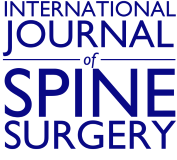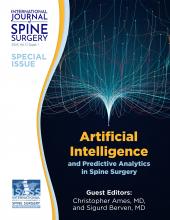Abstract
Adult spinal deformity (ASD) surgery is still associated with high surgical risks. Machine learning algorithms applied to multicenter databases have been created to predict outcomes and complications, optimize patient selection, and improve overall results. However, the multiple data points currently used to create these models allow for 70% of accuracy in prediction. We need to find new variables that can capture the spectrum of probability that is escaping from our control. These proposed variables are based on patients’ biological dimensions, such as frailty, sarcopenia, muscle and bone (tissue) sampling, serological assessment of cellular senescence, and circulating biomarkers that can measure epigenetics, inflammaging, and -omics. Many of these variables are proven to be modifiable and could be improved with proper nutrition, toxin avoidance, endurance exercise, and even surgery. The purpose of this manuscript is to describe the different future data points that can be implemented in ASD assessment to improve modeling prediction, allow monitoring their response to prerehabilitation programs, and improve patient counseling.
- spinal deformities
- artificial intelligence
- biomarkers
- frailty
- sarcopenia
- osteoporosis
- tissue sample
- metabolomics
- senescence
Footnotes
Funding The authors received no financial support for the research, authorship, and/or publication of this article.
Declaration of Conflicting Interests The authors report no conflicts of interest in this work.
Disclosures Sleiman Haddad reports payment/honoraria from Medtronic, Orthofix, and DePuy Synthes and support for attending meetings/travel from DePuy Synthes. Javier Pizones reports consulting fees from Medtronic and serving as the chair of the Eurospine Program Committee. Riccardo Raganato has no disclosures. Michael Safaee reports travel support for educational courses from Atec, DePuy Sythes, and Nuvasive. Ferran Pellisé reports grants or contracts from DePuy Synthes, Medtronic, Nuvasive, Orthofix, and Spineart; consulting fees from Medtronic; and a leadership or fiduciary role for the Scoliosis Research Society (secretary and Governance Council chair) and the European Spine Study Group (president). Christopher Ames reports royalties/licenses from Stryker, DePuy Synthes, Next Orthosurgical, Medicrea, Biomet Zimmer Spine, Nuvasive, and K2M; consulting fees from DePuy Synthes, Medtronic, Medicrea, K2M, Agada Medical and Carlsmed; leadership or fiduciary roles for ISSG (Executive Committee), Operative Neurosurgery – Neurospine (Editorial Board), SRS Safety and Value Committee (chair), and Global Spinal Analytics (director); and other financial or nonfinancial interests with Titan Spine (research), DePuy Synthes (research), ISSG (research), and SRS (grant funding).
Disclaimer The device(s)/drug(s) is/are FDA-approved or approved by the corresponding national agency for this indication.
- This manuscript is generously published free of charge by ISASS, the International Society for the Advancement of Spine Surgery. Copyright © 2023 ISASS. To see more or order reprints or permissions, see http://ijssurgery.com.







